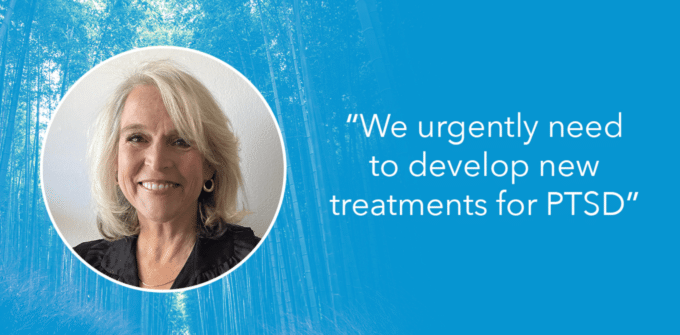In November 2021, Compass launched a phase 2 clinical trial to assess the safety and tolerability of COMP360 psilocybin therapy in post-traumatic stress disorder (PTSD). The study is taking place at two sites: the Institute of Psychiatry, Psychology & Neuroscience (IoPPN) at King’s College London, and Icahn School of Medicine at Mount Sinai.

Icahn School of Medicine, Mount Sinai
We spoke to Professor Rachel Yehuda, Director of the Center for Psychedelic Psychotherapy and Trauma Research at Icahn School of Medicine and a Principal Investigator on the trial, to find out more about the study and why it’s so important to develop new treatments for PTSD.
Tell us about this study of COMP360 psilocybin therapy in PTSD. What do you hope it will achieve?
This study will assess the safety and efficacy profile of COMP360 psilocybin therapy for trauma survivors with PTSD – this has never been studied in a clinical trial with PTSD patients. There is also almost no information about the kind of psychological support and psychotherapy needed with psilocybin in trauma survivors. There is a great need to understand the mechanism of action of COMP360 psilocybin therapy in this patient population, and towards that end, we will be collecting brain scans and blood samples for analysis of neurocognitive and epigenetic changes occurring in response to COMP360 psilocybin therapy. We hope our study will generate the information that will allow us to optimize COMP360 psilocybin in conjunction with psychotherapy for use in trauma survivors with PTSD.
What’s your role as Principal Investigator?
As Principal Investigator, my role has largely been to help design the clinical protocol and advise on a model of trauma-informed psychological support that will be synergistic with the pharmacological, metaphysical and psychological effects of COMP360 psilocybin. It has also been to develop the panel of biomarkers and behavioral tests and tasks that will be used to assess prediction and correlates of response.
Why are you passionate about working in mental health care?
I entered the field of mental health after receiving a Ph.D. in neuroscience. I was drawn to neuroscience because of its potential to examine how experience shapes brain function, and therefore, our emotions, thoughts, and behavior, but felt compelled to try to apply this knowledge to those with mental health conditions. Working in mental health care provides an opportunity to apply scientific knowledge about the brain to people who suffer from symptoms, with the goal of alleviating their emotional pain. It is estimated that between 20-40% of the population will develop a mental health condition over the course of their lives. These conditions greatly impact quality of life of individuals and families.
How does PTSD affect people’s lives?
Statistics demonstrate that 10-25% of people who develop symptoms in the aftermath of a trauma will fail to show normal recovery and post-traumatic adaption and will develop chronic PTSD. Chronic PTSD often hijacks one’s life and the life of their loved ones. People with PTSD are often concerned that what they experienced might happen to them again in some form, or their world view is shattered because they could not prevent what happened. They are often emotionally dysregulated, angry, shut down, and convinced that their physical survival has come at the expense of their humanity or capacity to engage with others in a meaningful way. The physiological symptoms — generally involving dysregulated fight-or-flight responses — take a physical toll as well and promote numerous, often serious, comorbid medical problems.
Why is it important to develop new treatments for people suffering with PTSD?
People often underestimate the degree of pain and disruption caused by PTSD. Many believe that healing from PTSD requires reviewing or processing what happened and trying to find some meaning in all of the suffering. Ideally in reviewing what actually happened, the patient comes to see that certain assumptions that they had about their own role in the trauma – such as, that what happened was their fault or they could have prevented some aspects of it – are not true, and this can help a lot. Processing trauma requires, first and foremost, reviewing what happened in a safe environment, and facing distressing memories to find insights that will release the survivor from inevitable feelings that their actions either caused the event, or failed to mitigate their harmful effects. This process requires self-compassion, self-forgiveness, insight, trust, acceptance of what happened, and resolve that one’s history does not determine one’s future. This self-reflection and exploration is often difficult to do in a normal state of consciousness because it can provoke too much distress in initial stages.
It is important to develop new approaches that allow people suffering from PTSD to do the critical work of trauma engagement and processing — these approaches must take into consideration the complex interconnections between biological, psychological, and social responses to adversity. I believe we need to develop new treatments, and critically evaluate their safety and efficacy, so that we can move forward in constructive, positive ways that promote resilience, healing, meaning-making, and post-traumatic growth.


